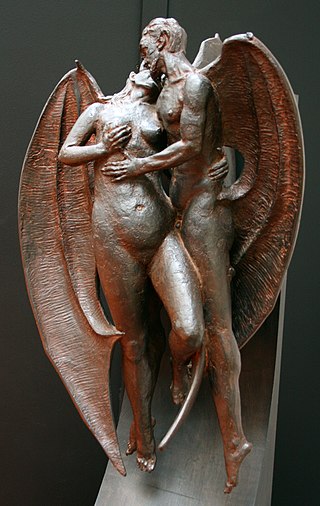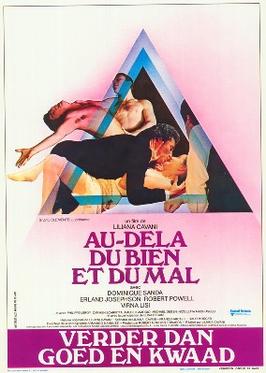
A devil is the personification of evil as it is conceived in various cultures and religious traditions. It is seen as the objectification of a hostile and destructive force. Jeffrey Burton Russell states that the different conceptions of the devil can be summed up as 1) a principle of evil independent from God, 2) an aspect of God, 3) a created being turning evil or 4) a symbol of human evil.

Evil, by one definition, is being bad and acting out morally incorrect behavior; or it is the condition of causing unnecessary pain and suffering, thus containing a net negative on the world.
The problem of evil is the philosophical question of how to reconcile the existence of evil and suffering with an omnipotent, omnibenevolent, and omniscient God. There are currently differing definitions of these concepts. The best known presentation of the problem is attributed to the Greek philosopher Epicurus. It was popularized by David Hume.

In the philosophy of religion, a theodicy is an argument that attempts to resolve the problem of evil that arises when all power and all goodness are simultaneously ascribed to God.

In Judaism and Christianity, the tree of the knowledge of good and evil is one of two specific trees in the story of the Garden of Eden in Genesis 2–3, along with the tree of life. Alternatively, some scholars have argued that the tree of the knowledge of good and evil is just another name for the tree of life.

The principle of double effect – also known as the rule of double effect, the doctrine of double effect, often abbreviated as DDE or PDE, double-effect reasoning, or simply double effect – is a set of ethical criteria which Christian philosophers have advocated for evaluating the permissibility of acting when one's otherwise legitimate act may also cause an effect one would otherwise be obliged to avoid. The first known example of double-effect reasoning is Thomas Aquinas' treatment of homicidal self-defense, in his work Summa Theologica.

The evil eye is a supernatural belief in a curse brought about by a malevolent glare, usually inspired by envy. Amulets to protect against it have been found dating to around 5,000 years ago.
In most contexts, the concept of good denotes the conduct that should be preferred when posed with a choice between possible actions. Good is generally considered to be the opposite of evil and is of ethics, morality, philosophy, and religion. The specific meaning and etymology of the term and its associated translations among ancient and contemporary languages show substantial variation in its inflection and meaning, depending on circumstances of place and history, or of philosophical or religious context.

Beyond Good & Evil is a 2003 action-adventure game developed and published by Ubisoft for PlayStation 2, Windows, Xbox, and GameCube. The story follows the adventures of Jade, an investigative reporter, martial artist, and spy hitwoman working with a resistance movement to reveal a sinister alien conspiracy. Players control Jade and other allies, solving puzzles, fighting enemies, obtaining photographic evidence and, later in the game, travelling to space.
In the Dungeons & Dragons (D&D) fantasy role-playing game, alignment is a categorization of the ethical and moral perspective of player characters, non-player characters, and creatures.
Moral evil is any morally negative event caused by the intentional action or inaction of an agent, such as a person. An example of a moral evil might be murder, war or any other evil event for which someone can be held responsible or culpable. This concept can be contrasted with natural evil, in which a bad event occurs naturally, without the intervention of an agent. The dividing line between natural and moral evil is not absolutely clear however, as some behaviours can be unintentional yet morally significant.

Sedreh is the Avestan term for the undergarment worn by Zoroastrians, which is worn alongside the Kushti.

Beyond Good and Evil is a 1977 Italian-French drama-biographical film co-written and directed by Liliana Cavani and starring Dominique Sanda, Erland Josephson and Robert Powell. The story follows the intense relationship formed in the 1880s between Friedrich Nietzsche, Lou Salomé and Paul Rée.
"There Ain't No Good Chain Gang" is a song written by Hal Bynum and Dave Kirby, and recorded by American country music artists Johnny Cash and Waylon Jennings. It was released in May 1978 as the second single from the album I Would Like to See You Again. The song reached #2 on the Billboard Hot Country Singles & Tracks chart.

Pandora's box is an artifact in Greek mythology connected with the myth of Pandora in Hesiod's c. 700 B.C. poem Works and Days. Hesiod related that curiosity led her to open a container left in the care of her husband, thus releasing curses upon mankind. Later depictions of the story have been varied, with some literary and artistic treatments focusing more on the contents than on Pandora herself.
Thawāb, Sawab, Hasanat or Ajr is an Arabic term meaning "reward". Specifically, in the context of an Islamic worldview, thawāb refers to spiritual merit or reward that accrues from the performance of good deeds and piety based on the guidance of the Quran and the Sunnah of Prophet Muhammad.
Bardo Chham is a folk dance traditional to the Himalayan Buddhist Tribes of Arunachal Pradesh, India. Here in, "Bardo" means "the limbo between death and rebirth" in Tibetan Buddhism, as under the Tibetan Book of Dead. While Chham, literally translates to "Dance" in Tibetan. Bardo Chham is based on the stories of the triumph of good over evil. According to the local beliefs, both good and evil exists within mankind. The dance is portrayed with the use of traditional wooden masks, representing the different animals and characters there in.

In philosophy, religion, and psychology, "good and evil" is a common dichotomy. In religions with Manichaean and Abrahamic influence, evil is perceived as the dualistic antagonistic opposite of good, in which good should prevail and evil should be defeated. Taoist philosophies typically perceive the world through a dualistic cosmological lens, where this dichotomy is a central concept, and often symbolized by the taijitu, commonly known as the "yin-yang".
"Evil Allures, But Good Endures" is a short story by Leo Tolstoy written in 1885. It is commonly included in the massively-reproduced collection Twenty-three Tales.











